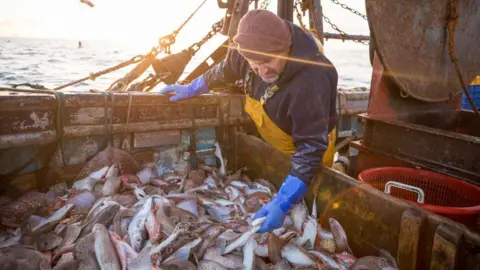BBC Verify
 Getty Images
Getty ImagesA deal to “reset” relations between the UK and the EU following Brexit has been agreed at a summit in London.
The agreement covers a range of issues, including defence, fishing, the trade in food products and the ability of young people to move freely between the UK and the EU.
BBC Verify has gone through the deal, picking out the potential winners and losers.
Food
 Getty Images
Getty ImagesWinner: UK food exporters to the EU who could see fewer checks
Loser: People who don’t want the UK to follow EU rules, as there are strings attached
Since Brexit, UK goods travelling to the EU – including food products – have faced new checks and extra paperwork.
Some items, such as UK exports of raw burgers and sausages, have been banned from entering the EU because they do not meet its strict import rules.
UK food exports to the EU have fallen – with volumes in 2024 down 34% compared with 2019 – and the industry blames this partly on the added red tape.
Now, both sides have agreed to work on a joint food safety agreement that could remove many of the current barriers.
If signed and fully implemented, it would reduce paperwork, ease checks, and could even lift bans on products like raw meats.
Food and drink exports to the EU in 2023 were worth £14bn, accounting for 57% of all the sector’s overseas sales.
But the deal comes with conditions. The UK will need to follow future EU food standards – a system known as “dynamic alignment” – and accept that the European Court of Justice will have the final say in any disputes in this area.
The UK will be also required to make a financial contribution. However is it currently unknown how much the payment would be and when it would be required.
Fishing
 Getty Images
Getty ImagesWinner: The EU – fishing vessels get 12 more years of access to UK waters
Loser: UK fishermen who wanted annual negotiations on fishing access
Although fishing accounts for a very small part of the UK economy – just 0.04% of GDP in 2024 – it is politically sensitive.
The “reset” document notes “political agreements leading to full reciprocal access to waters to fish until 30 June 2038” – a 12-year extension to the current deal negotiated by Boris Johnson’s Conservative government – and much longer than expected.
Under the existing agreement (due to expire in 2026), EU vessels get access to UK waters to fish – in return for transferring 25% of their fishing quota – the amount they are allowed to catch – to UK fleets.
Some UK fishing groups have criticised the existing deal and do not want to see it extended.
Elspeth Macdonald, who represents 450 fishing boats as chief executive of the Scottish Fishermen’s Federation says: “This deal is a horror show for Scottish fishermen, far worse than Boris Johnson’s botched Brexit agreement.”
She says the long-term deal takes away the industry’s bargaining power in future talks and would prefer annual negotiations with the EU.
Prime Minister Sir Keir Starmer says there will be “no increase in the amount that the EU vessels can catch in British waters” and says it will now be easier for UK fishermen to export their products.
In 2023, the UK exported £1.2bn of fish to the EU, around 70% of all fish exports.
Tavish Scott from Salmon Scotland, which represents salmon farming in Scotland, says the agreement to reduce checks would “speed up the delivery of our premium salmon to market”.
Youth mobility
 Getty Images
Getty ImagesWinner: Young people in the UK and EU who should – if this is confirmed – be able to work and study more freely between the two
Loser: Those who oppose an increase in net migration to the UK will point out that any mobility scheme could affect immigration figures, although this effect may be temporary
The details here are still to be confirmed, but the winners would be those young people from both the UK and EU who would be able to work and study more easily across Europe and Great Britain. Other youth mobility schemes have focused on people aged 18 to 30.
However, the impact of what is being called a “youth experience scheme” could be uneven.
Before Brexit more young people from the EU came to the UK than went the other way.
And, remember, Sir Keir has pledged to “significantly” reduce immigration levels in the coming years. So there’s a big question mark on what impact a UK-EU scheme could have on UK immigration levels.
Madeleine Sumption from Oxford University’s Migration Observatory told BBC Verify that a scheme would likely increase net migration in the short term, as new participants arrive.
However, she adds that if everyone left the UK when their visa expired, the long-term impact on migration levels would be minimal.
“If the UK is worried about the impact, it could phase in the scheme, where it gradually increases the quota. So as people leave, the quota could be raised rather than a big bang all come at once,” she said.
eGates
 Getty Images
Getty ImagesWinner: British tourists may be able to use eGates at EU airports but we do not know which ones and from when
Loser: Those expecting to escape long queues this summer
As part of the agreement, UK nationals will be able to use eGates at EU airports, rather than having their passport manually checked by a border officer.
The government claims: “British holidaymakers will be able to use more eGates in Europe, ending the dreaded queues at border control.”
However the text of the EU-UK agreement is less clear, only referring to the “potential use of eGates where appropriate”.
It is unlikely any change will be implemented by the summer, travel organisation Abta told BBC Verify.
Abta believes the deal clarifies that the EU countries can offer eGates to UK nationals once a new Entry/Exit System (EES) comes into effect in October.
EES is an automated IT system for registering all non-EU travellers for a short stay, each time they cross the EU’s external borders.
Whether UK passengers will avoid a border guard altogether will depend on the technology at each border crossing, Abta says.
Defence
Winner: UK defence firms may get contracts from new EU rearmament fund
Loser: EU defence firms which hoped to get more of these revenues
The EU has established a Security Action for Europe fund (SAFE) with €150bn (£126bn) of loans, backed by the EU budget, to enable its member states to rearm.
This was going to be spent on EU-based defence firms. The fund also allows for the involvement of a number of non-EU countries and could now be opened up to UK defence companies too. This would potentially allow EU firms to use the fund to buy kit from the UK.
The UK has a large defence manufacturing industry relative to many EU states and this sector directly employs about164,00 people in the UK.
Between 2020 and 2024, the UK was estimated by the Stockholm International Peace Research Institute to have accounted for around 3.6% of total global annual arms exports, making the UK the seventh largest national exporter.
Again, the detail is still being worked out here and we do not know when and exactly how the UK will participate in the fund.


